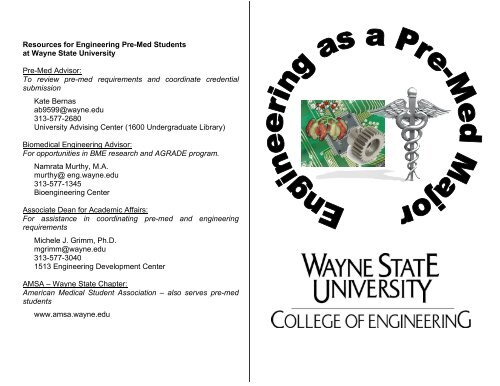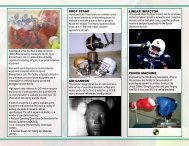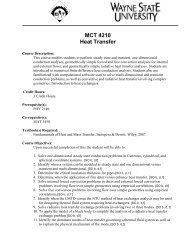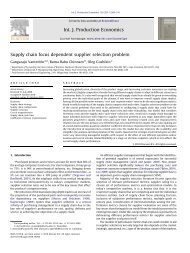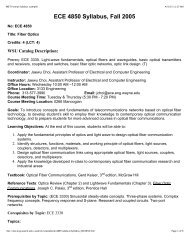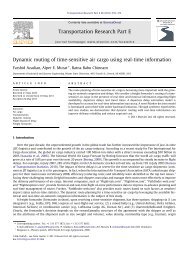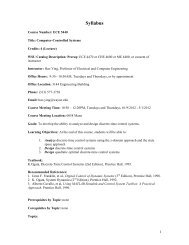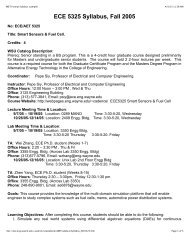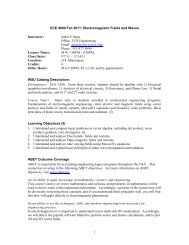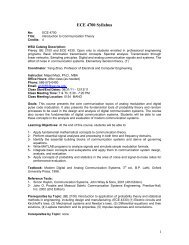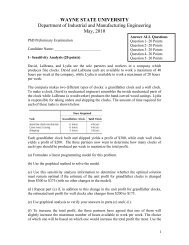Engineering as a Pre-Med Major - College of Engineering - Wayne ...
Engineering as a Pre-Med Major - College of Engineering - Wayne ...
Engineering as a Pre-Med Major - College of Engineering - Wayne ...
- No tags were found...
Create successful ePaper yourself
Turn your PDF publications into a flip-book with our unique Google optimized e-Paper software.
Resources for <strong>Engineering</strong> <strong>Pre</strong>-<strong>Med</strong> Studentsat <strong>Wayne</strong> State University<strong>Pre</strong>-<strong>Med</strong> Advisor:To review pre-med requirements and coordinate credentialsubmissionKate Bern<strong>as</strong>ab9599@wayne.edu313-577-2680University Advising Center (1600 Undergraduate Library)Biomedical <strong>Engineering</strong> Advisor:For opportunities in BME research and AGRADE program.Namrata Murthy, M.A.murthy@ eng.wayne.edu313-577-1345Bioengineering CenterAssociate Dean for Academic Affairs:For <strong>as</strong>sistance in coordinating pre-med and engineeringrequirementsMichele J. Grimm, Ph.D.mgrimm@wayne.edu313-577-30401513 <strong>Engineering</strong> Development CenterAMSA – <strong>Wayne</strong> State Chapter:American <strong>Med</strong>ical Student Association – also serves pre-medstudentswww.amsa.wayne.edu
Why do engineers make great doctors?Technical Know-How<strong>Med</strong>icine in the 21 st century grows more and more quantitative andtechnical in nature. It is important for medical doctors to have <strong>as</strong>trong understanding <strong>of</strong> the technology behind medical interventionsand the quantitative nature <strong>of</strong> how the body works. <strong>Engineering</strong>provides a firm foundation on which you can build this specializedknowledge.Problem Solving AbilityThe foundation <strong>of</strong> engineering is problem solving – identifying aproblem, <strong>as</strong>sessing needs, formulating potential solutions, andevaluating the solutions to select the best option. The process that isinvolved with engineering design can also be applied directly to bothclinical practice and medical research. An engineering educationteaches skills that you will find immediately relevant to medicine.TeamworkIn the world <strong>of</strong> modern medicine, treating patients <strong>of</strong>ten requires ateam approach involving doctors, nurses, and allied healthpr<strong>of</strong>essionals. Working with multidisciplinary teams is a key skill forgood clinical practice. <strong>Engineering</strong> survives on teamwork too – andgraduates <strong>of</strong> engineering programs have had significant experiencewith successful team projects, putting you in a good position to leadteams to support patient health.How do medical schools view engineering majors?<strong>Med</strong>ical schools today are looking to build a diverse student body –not admit an entire cl<strong>as</strong>s <strong>of</strong> biology majors. <strong>Engineering</strong> majors standout in the crowd, demonstrating their academic ability and theircommitment to succeed. Admissions committees realize thatpursuing an engineering degree is not the path <strong>of</strong> le<strong>as</strong>t resistance tomedical school. As an engineering major with strong MCAT scoresand excellent science grades, you would present yourself <strong>as</strong> a strongcandidate to any medical school in the country.What opportunities do I get by majoring in engineering?Graduates from engineering programs have many doors open tothem, in addition to medical school. If for any re<strong>as</strong>on you decide notto attend medical school, an engineering degree will have preparedyou for immediate employment, graduate school, or otherpr<strong>of</strong>essional fields (including law, business, and education). <strong>Wayne</strong>State engineering students have the option <strong>of</strong> earning an MS inBiomedical <strong>Engineering</strong> with only one additional year <strong>of</strong> studythrough the AGRADE program.At <strong>Wayne</strong> State, engineering students have the opportunity tobecome involved with biomedical engineering research starting <strong>as</strong>soon <strong>as</strong> their freshman year. Many students become co-authors onpeer-reviewed articles. This outstanding experience will incre<strong>as</strong>eyour understanding <strong>of</strong> biomedical systems and set you apart fromother medical school applicants.How will the pre-med requirements fit in with my engineeringrequirements?Due to the nature <strong>of</strong> engineering education, pre-med requirementswill require some cl<strong>as</strong>ses beyond the minimum curriculum. However,many other courses fit right into the engineering major. The followinglist <strong>of</strong> common medical school admissions requirements indicateswhich courses meet WSU <strong>College</strong> <strong>of</strong> <strong>Engineering</strong> (COE) degreerequirements and which may be required in addition to your degree:SubjectStandard <strong>Med</strong>icalAdmissionsRequirement<strong>Engineering</strong>RequirementAdditionalRequirementMath 2 semesters MAT 2010 & 2020 NoneEnglish 2 semesters ENG 1020 & 3050 NonePhysics 2 semester w/ lab PHY 2175 &2185 Lab required*InorganicCHM 2280/22902 semesters w/ lab CHM 1225/1230Chemistryrequired**OrganicChemistry2 semesters w/ labCHM 1240/1250& CHM2220/2230 **BIO 1510 labrequiredBIO 1510 and BMEBiology 2 semesters w/ lab5010 (Tech Elective)* - EE students must take 1 st semester (PHY 2171) lab.** - ChE students must take CHM 1240/1250, CHM 2220, and CHM 5440 (physical chemistry)or CHM 5600 (biochemistry). CHM 5440 may count <strong>as</strong> the 2 nd semester <strong>of</strong> inorganicchemistry. <strong>Med</strong>ical schools may accept ChE labs in place <strong>of</strong> the 2 nd sem inorganic lab.Students who select the Biological <strong>Engineering</strong> concentration withinChemical <strong>Engineering</strong> have only 9 additional required credits(inorganic chemistry & 4 lab courses) in order to meet the medicalschool admissions requirements. Other majors in engineeringtypically have an extra 17 to 18 credits <strong>of</strong> coursework beyond theirnormal requirements, primarily in the area <strong>of</strong> chemistry.The <strong>College</strong> <strong>of</strong> <strong>Engineering</strong> works with our pre-med students and theUniversity’s pre-med advisor to develop a curriculum that moves eachstudent towards their two goals. Individualized schedules aredeveloped with both the MCAT and prerequisite sequencing in mind.


